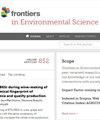A study of the driving factors of the intention and behavioral deviations of rural residents in waste classification
IF 3.3
3区 环境科学与生态学
Q2 ENVIRONMENTAL SCIENCES
引用次数: 0
Abstract
Introduction: The deviation between the stated intentions and actual actions of rural residents regarding waste classification constitutes a significant impediment to the effective implementation of environmental management strategies in rural areas. It is therefore recommended that steps be taken to reduce the deviation between the stated intentions and actual behaviors of rural residents. Doing so will help to reinforce environmental governance in rural communities and provide the necessary support for rural revitalization.Methods: This study establishes an analytical framework for examining the deviation between the internal perceived efficacy and external environmental policies among rural residents. The relationship between intention and behavior can be classified into three distinct scenarios: “intention with behavior,” “intention without behavior,” and “no intention with behavior.” Furthermore, an empirical analysis is conducted using survey data collected by Nanjing Agricultural University in the China Land Economic Survey in June and July 2021.Result: The results show that 1) the perceived efficacy has a significant positive influence on the deviation between the intention and behavior of rural residents in domestic waste classification, while the environmental policy has a significant negative effect on it; 2) the guiding policy has a significant negative moderating effect on the influence of perceived efficacy on the deviation between the intention and behavior of rural residents and the situation of “with intention and without behavior,” while the reward–punishment policy has a significant positive moderating effect on the influence of perceived efficacy on “without intention and behavior;” 3) the perceived efficacy has a masking effect on the impact of environmental policies on the deviation between the intention and behavior or “with intention and without behavior” of rural residents and a partial mediating effect on the impact of the environmental policy on “with intention and behavior” or “without intention and behavior.”Discussion: In consideration of these findings, the study proposes policy recommendations that emphasize the interconnectivity of the government, village collective organizations, and rural residents. The recommendations include the implementation of environmental policies and initiatives designed to enhance rural residents’ awareness of waste classification.农村居民垃圾分类意向和行为偏差的驱动因素研究
导言:农村居民在垃圾分类方面的既定意图与实际行动之间存在偏差,严重阻碍了农村地区环境管理战略的有效实施。因此,建议采取措施,减少农村居民在垃圾分类方面的表述意图与实际行动之间的偏差。这样做将有助于加强农村社区的环境治理,并为乡村振兴提供必要的支持:本研究建立了一个分析框架,用于研究农村居民内部感知效能与外部环境政策之间的偏差。意向与行为之间的关系可分为三种不同的情况:"有行为的意向"、"无行为的意向 "和 "无行为的意向"。此外,利用南京农业大学在 2021 年 6 月和 7 月中国土地经济调查中收集的调查数据进行了实证分析:结果表明:1)感知效能对农村居民生活垃圾分类意向与行为偏离有显著的正向影响,而环境政策对其有显著的负向影响;2)引导政策对感知效能对农村居民生活垃圾分类意向与行为偏离和 "有意向无行为 "的影响有显著的负向调节作用,而奖惩政策对感知效能对 "无意向有行为 "的影响有显著的正向调节作用;" 3)感知效能对环境政策对农村居民 "有意向与行为 "或 "有意向与无行为 "偏差的影响具有遮蔽效应,对环境政策对 "有意向与行为 "或 "无意向与行为 "的影响具有部分中介效应。"讨论:鉴于上述研究结果,本研究提出了强调政府、村集体组织和农村居民之间相互联系的政策建议。这些建议包括实施旨在提高农村居民垃圾分类意识的环保政策和举措。
本文章由计算机程序翻译,如有差异,请以英文原文为准。
求助全文
约1分钟内获得全文
求助全文
来源期刊

Frontiers in Environmental Science
Environmental Science-General Environmental Science
CiteScore
4.50
自引率
8.70%
发文量
2276
审稿时长
12 weeks
期刊介绍:
Our natural world is experiencing a state of rapid change unprecedented in the presence of humans. The changes affect virtually all physical, chemical and biological systems on Earth. The interaction of these systems leads to tipping points, feedbacks and amplification of effects. In virtually all cases, the causes of environmental change can be traced to human activity through either direct interventions as a consequence of pollution, or through global warming from greenhouse case emissions. Well-formulated and internationally-relevant policies to mitigate the change, or adapt to the consequences, that will ensure our ability to thrive in the coming decades are badly needed. Without proper understanding of the processes involved, and deep understanding of the likely impacts of bad decisions or inaction, the security of food, water and energy is a risk. Left unchecked shortages of these basic commodities will lead to migration, global geopolitical tension and conflict. This represents the major challenge of our time. We are the first generation to appreciate the problem and we will be judged in future by our ability to determine and take the action necessary. Appropriate knowledge of the condition of our natural world, appreciation of the changes occurring, and predictions of how the future will develop are requisite to the definition and implementation of solutions.
Frontiers in Environmental Science publishes research at the cutting edge of knowledge of our natural world and its various intersections with society. It bridges between the identification and measurement of change, comprehension of the processes responsible, and the measures needed to reduce their impact. Its aim is to assist the formulation of policies, by offering sound scientific evidence on environmental science, that will lead to a more inhabitable and sustainable world for the generations to come.
 求助内容:
求助内容: 应助结果提醒方式:
应助结果提醒方式:


